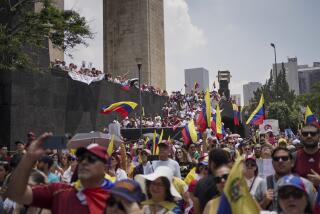Marcos Loyalists Call Rebel Assembly, Launch Anti-Aquino Campaign
- Share via
MANILA — With thousands of party workers outside carrying two-by-fours, rocks and signs declaring “President Marcos, Please Come Home,” the political leaders that Ferdinand E. Marcos left behind launched a major protest campaign Monday against the new government of Corazon Aquino.
A rebel session of the Philippine National Assembly capped two days of anti-government street protests by Marcos loyalists that left at least 60 people injured in rock-throwing battles and street clashes with government supporters.
Several civilians were hospitalized Monday with gunshot wounds that they said they received from police anti-riot troops. (The Associated Press later quoted officials as saying that one person was killed.)
Civil Disobedience Urged
Meeting at a suburban university hall, 93 pro-Marcos members of the assembly that Aquino dissolved last month called for a nonviolent campaign of civil disobedience aimed at driving her government from power.
They denounced Aquino’s government as illegal and passed a series of resolutions nullifying and condemning several of her presidential proclamations and appointments.
“There are millions of silent Filipinos who cannot accept a government established under the law of force,” declared former vice presidential candidate Arturo Tolentino, chosen by the defunct assembly as “the new symbol--the new chieftain of the entire opposition movement.” Tolentino continued:
“The claim that the people of the Philippines have accepted this unlawful government is a figment of the imagination. This silent majority is now beginning to assert its non-acceptance of the present regime. They have recovered from shock and are now moving and speaking up.”
Death Toll Disputed
During their session, the pro-Marcos legislators observed a moment of silence for 10 supporters they claimed were killed in the demonstrations. However, police and government officials denied that any deaths had occurred, as did spokesmen for several large Manila hospitals and funeral homes.
Still, Tolentino warned that the recent violence may be only the beginning, and he told his supporters, “You can resist illegal force with legitimate force.
“The blood is now on the hands of the present administration, and if there are more deaths, these too will be on their conscience, if they have a conscience.”
But beyond the fiery speeches by Tolentino and former Labor Minister Blas Ople, who charged that Aquino abolished the 183-member legislative body because “she must indulge the vengeance in her heart,” most Filipino political analysts agreed that the rebel session will have little impact on the stability of Aquino’s six-week-old government.
Aquino, who rose to power when a 72-hour civilian and military rebellion drove Marcos into exile in Hawaii in late February, said several times in recent days that the disgruntled, pro-Marcos legislators had every right to assemble Monday. Allowing that meeting, she said, would prove “I am not a dictator.”
No Aquino Backers Attend
None of the 57 legislators from the two coalition parties that support Aquino attended the rebel session--not even several of Aquino’s Cabinet ministers who had disagreed publicly with her decision to abolish the body.
Aquilino Pimentel, Aquino’s minister of local government, who initially counseled Aquino to retain the popularly elected legislature, described the session Monday as “an assembly of disgruntled elements of society.”
Among the resolutions passed by the assembly was a measure aimed directly at Pimentel, who has fired more than 100 pro-Marcos governors and mayors elected in 1981 and replaced them with Aquino loyalists in the weeks since she assumed power. In a unanimous vote, the 93 legislators declared every appointment illegal, null and void.
Again, however, Pimentel said the rebel assembly’s resolution would have no effect on “the reality of the situation.”
It was Pimentel’s campaign to purge the local officials who once formed Marcos’ powerful national political machine that led to the worst of Monday’s violence. The clash occurred outside the municipal building in the Manila district of San Juan, where supporters of the ousted pro-Marcos mayor clashed with Aquino loyalists.
Asked whether the violence coinciding with the assembly meeting could destabilize Aquino’s new government, Pimentel said: “The problem will arise only if we overreact. As long as we keep our cool, there will be no problem.”
Aquino’s political affairs minister, Antonio Cuenco, added, “These demonstrators do not have the support of the people, so we don’t see this thing that they are doing as a threat to the stability of this government.”
The organizers of Monday’s assembly session were not so certain.
Destabilizing Act
In an interview before the meeting, former minister Ople said Aquino’s decision to dissolve the legislature and constitution and assume near-dictatorial powers was, in itself, a destabilizing act.
“If the government of Aquino falters--and, at this rate, it is generating its own disabilities every day--we want this body in place to serve as an institution in democracy if some other forces in our society should take over,” Ople said in an apparent reference to a possible military takeover.
Ople said the assembly will spend the next several weeks in recess drafting a parallel constitution as Aquino begins the process of selecting 30 to 50 members of a presidential committee that will draft an official proposed constitution. Ultimately, that draft will be put to a nationwide vote.
Even Ople conceded, though, that the actions of the rump assembly will be, at best, advisory.
“The onus will be on the Aquino government to accept or reject the laws or resolutions that will be adopted by this body,” he said. “After all, we have no army. We have no government. And, no, we have no real power any more.”
More to Read
Sign up for Essential California
The most important California stories and recommendations in your inbox every morning.
You may occasionally receive promotional content from the Los Angeles Times.













